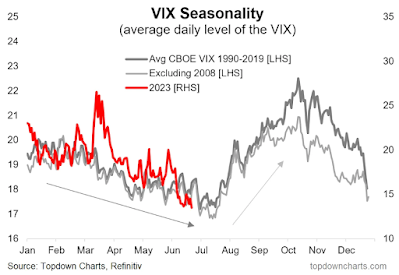*** denotes well-worth reading in full at source (even if excerpted extensively here)
Economic and Market Fare:
How A Fed Rate Pause Is Likely To Morph Into A Cut
........There are three main factors that could alter the Fed’s decision-making framework and prompt it to step back from its hiking cycle after a hiatus:
- The Fed very rarely raises rates again after pausing when policy is already restrictive
- Inflation will keep falling in the coming months, while labor-cost pressures are being revised significantly lower
- The jobs market is weakening fast
Last week the Fed effectively announced there would be no rate hike at the June 14th FOMC meeting, but there might be a hike at the July 26th meeting. I think the information we have to date strongly suggests that the Fed is done—no more hikes. The only question now is when they start to cut and by how much. Currently, the bond market is priced to a 50% chance of a 0.25% hike at the late July meeting, and at least a 1% cut by year end, with the peak funds rate coming in late summer. I think there's a decent chance we will see short-term rates end up lower than current expectations. My reason for being bullish on bonds (i.e., expecting lower interest rates) is based my observation that inflation will continue to decline. I'm optimistic the economy will avoid a recession because I see low and falling swap and credit spreads, which in turn are indicative of a healthy outlook for the economy and corporate profits. ...
(not just) for the ESG crowd:
Climate change or climate terrorism?
........................ There was no innate reason why economic referees would approve the publication of a paper as full of ignorant assumptions as Nordhaus’s paper was, except that the referees themselves were not experts on climate change, and were in no position to sensibly evaluate his claims. Since Nordhaus’s nonsense is the foundation of all the empirical trivialisation of the dangers of climate change, he has played a pivotal role in blinding us to the dangers that scientists have been warning about for over half a century now.
As the only critic of Nordhaus’s to focus on the absurdity of his and his followers’ empirical estimates, I have joined the scientists Jim Hansen (Hansen et al. 2006; Hansen et al. 2022), Tim Lenton (Lenton et al. 2008; Lenton et al. 2019; Xu et al. 2020), Will Steffen (Steffen et al. 2018) and many others as a Cassandra on climate change. They are the experts on climate change, and why it is so dangerous, not me. But I have helped explain one thing they could not: why were their warnings being ignored?
Yes., it was because the fossil fuel industry ran a disinformation campaign, so that the gravy train on which they rode could continue until the end. But the fossil fuel industry, and shrills like Bjorn Lomborg (Lomborg 2020), could not have been as effective if they were not able to rely upon predictions by economists that the economic consequences of climate change would be slight. If fossil fuel companies are the armies fighting against meaningful action on climate change, then economists are their arms dealers.
The Trojan Horse Arrives?
In mythology, and possibly even history, Cassandra’s key prediction was to “Beware of Greeks bearing gifts”: the Trojan Horse. That ignored warning led to the sacking of Troy. Well over half a century of climate change warnings have been ignored to date, and the data for this year is making many climate scientists fearful that the Climate Trojan Horse has finally arrived. The current data for climate anomalies is simply off the scale compared to any previous year. The following graphs—sourced from Climate Change Twitter—emphasise just how scarily unique 2023 is proving to be. ......





























































